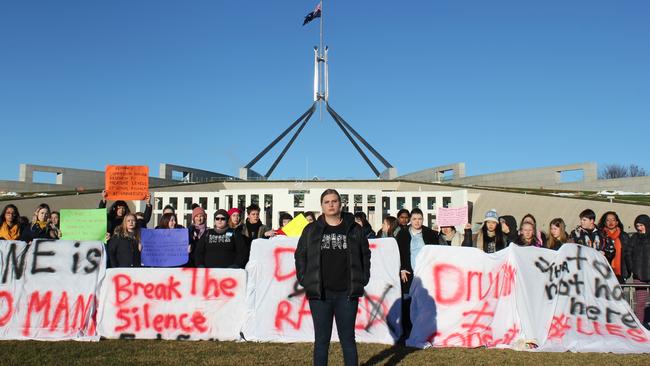Victory for students: Free hotline announced for victims of sexual assault
SOON, students will finally have access to a free hotline, giving them access to sexual assault counsellors. Freya’s story shows why it’s so important.
IMAGINE the courage it takes for a rape victim to put up their hand and ask for help. Now imagine what it’s like when they are told they must wait over six weeks for the next available counselling appointment.
When Freya, a 20-year-old university student from the ACT, disclosed that she’d been sexually assaulted in 2015, she was told precisely this.
Patiently, Freya bided her time waiting over a month for an intake appointment with a rape-crisis counsellor. But after two face-to-face appointments, Freya was informed that her counsellor was leaving and she would have to wait another six weeks for a new counsellor.
Desperate for support, Freya turned to her university’s own counselling centre. She was told she’d need to wait another three weeks for an appointment, but could drop-in for an emergency 25 minute appointment if necessary.
“By then I was at the height of trauma. I was catatonic” says Freya who took up the offer for the drop-in appointment.
“The session only went for 25 minutes. I just got through explaining the history of my assault and time was up, with no real counselling.”
The counsellor then handed Freya a fact sheet on Post Traumatic Stress Disorder which bewildered Freya, who was unsure of whether that meant she’d just been diagnosed with PTSD.
She was sent on her way and never returned.
In 2016, Freya’s mental health deteriorated further. She was appointed a Women’s Officer at her residential hall, meaning that she suddenly became the go-to person for other students who had experienced rape.
With minimal training, and still dealing with her own trauma, Freya began receiving traumatic disclosures of rape and assault, something she said only exacerbated her own trauma.

The horrifying reality is that Freya’s experience is not unique.
In May, I conducted a comprehensive audit of all 39 University counselling services along with End Rape On Campus Australia. What we found horrified us. In addition to the long wait times, we found that rape victims who were in counselling were being abruptly cut off from the service if they dropped out of their degree because of the trauma.
The quality of counselling at some universities was considered so poor, that SRC Caseworkers outright refused to refer rape victims to the counselling service.
Even worse, several universities who refused to see rape victims after they dropped out, advertised on their website that they could provide counselling to their rapists.
Off the back of these results, End Rape On Campus Australia called for the establishment of a national, centralised, 1800 Hotline to be run by Rape and Domestic Violence Services Australia (RDVSA), the peak body in expert sexual assault counselling.
The call was backed by the National Union of Students, several high profile academics, politicians and case workers at multiple universities. A petition for the hotline also received over 2000 signatures.
Today, we had a victory.
On our advice, Universities Australia have heard the call, and have announced that they will implement a new hotline run by RDVSA, commencing August 1, 2017.
The new 24/7 hotline will mean that all student survivors (including those who have dropped out of their degrees) will be able to access quality counselling support at the time they need it most. It will also mean that there will be a consistency in the quality of counselling offered to survivors regardless of which university they go to.
The Hotline will also differ significantly from 1800 RESPECT in that the phones will be answered by trauma counsellors who are working out of real offices.
(Last year the contract for 1800 RESPECT changed hands, and the hotline is now answered by operators of who are working out of their own homes, and are not required to have trauma expertise. This has led to multiple problems — including confidentiality breaches and a substantial drop in the quality of counselling. So much so, that End Rape On Campus Australia now outright refuse to refer anyone to 1800 RESPECT.)
While there is still much work to do in terms of how universities prevent sexual assault on campus, and how they discipline offenders (including staff who have raped students) this is an excellent outcome.
At last women like Freya will be able to access an expert counselling service that will provide a compassionate, appropriate and respectful response.
This is no more and no less than they deserve.
Nina Funnell is a freelance writer, sexual assault advocate and ambassador for End Rape On Campus Australia. She is a former board member of Rape and Domestic Violence Services Australia and was a leading instigator in the call for a new 1800 Hotline.




